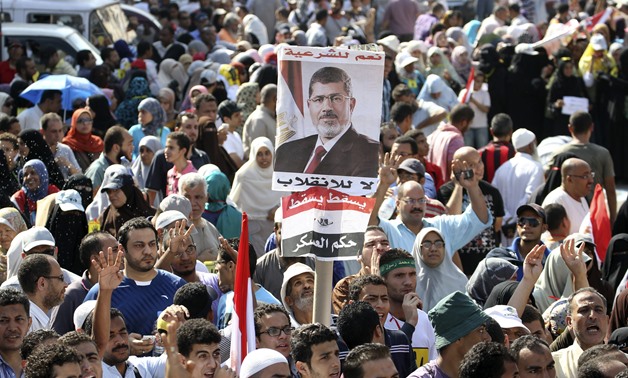This is part two of a two-part series. Read part one here.
The military regime in Egypt has been waging a fierce media battle against the Muslim Brotherhood to eradicate political Islam. It is a policy of revenge directed towards the Arab Spring that overthrew Mubarak’s tyrannical regime and helped bring the movement to power.
At the same time, certain members of the American right have been urging the designation of the Muslim Brotherhood as a terrorist organization, like Hamas and Hezbollah, under the material support statute. A fan of the idea, Donald J. Trump is leaning towards calling Muslim Brothers terrorists.
Congressman Ted Cruz reintroduced a bill early this year that would require the Secretary of State to produce a report for the Congress on “whether the Muslim Brotherhood meets the criteria for assignment as a terrorist organization” and, if not, would incorporate “an itemized legitimization as to which criteria have not been met.”
The ruling regimes in the Arab region have not learned from the past, as history proves that political Islam thrives on repression and always invests in the narrative of its supporters’ plight to maintain its sustenance.
The Arab rulers do not realize that political Islam is a popular movement, as opposed to just a political movement, one with strong beliefs that cannot easily be uprooted and defeated. Many rulers have tried and failed to suppress the Islamists, among them Gamal Abdel Nasser during the 1960s.
Every time the Islamists returned stronger. The “Black Decade” in Algeria in the 90s is a good example. The bloody conflict began in January 1992, after the cancellation of the results of the democratic 1991 parliamentary elections in Algeria, which gave the Islamic Salvation Front victory, prompting the Algerian army to intervene and cancel the parliamentary elections in the country.
Most Islamists were arrested and put in seven concentration camps located in the Algerian desert. They suffered from organized killings and intensive torture for years. In 2005, reconciliation between the Supreme Council of the Armed Forces and Islamists occurred. As time goes on, Islamists in Algeria are slowly gaining their old position back, and the future of the country can play out differently.
These authorities in the Arab world neither read nor understand history’s lessons, as their inability to learn from their mistakes shows. Moderate Islamists, the most pragmatic political people, can enter into realistic political deals with the ruling regimes on acceptable negotiable terms.
For instance, a report by the U.K. House of Commons said that even though Muslim Brothers committed some violence during the protests against the military coup, they are capable of negotiation. It also noted that “in their definitions of democracy, political Islamists have sometimes emphasized a highly mechanical understanding that equates democracy with elections and reduces elections to an outcome of ‘winners’ and ‘losers’.”
The Tunisian case is a good example of accepting the Muslim Brotherhood as alternative power. Following Tunisia’s 2011 revolution, the Muslim Brotherhood in Tunis gave up power in the presidential elections and acknowledged the rise of Beji Caid Essebsi’s liberal old regime. However, it won the municipal elections convincingly a few years later.
Although the fortunes of political Islam have recently fallen on hard times in Egypt, the movement continues to exist. Its power may have diminished, but neither the political Islam nor its ideology has died. The military regime’s battle against political Islam, therefore, is futile.
Moreover, such an undertaking is contrary to the logic of complex culturally religious societies. If the Muslim Brotherhood was allowed to participate collaboratively in a national project that guarantees the inclusion of other political forces and work within a power structure based on the values of citizenship, they would have a strong impact on the future politics of Egypt.
The report by the U.K. House of Commons underscored the necessity of assessing the exposure to free and fair elections and the need to appeal to a broad range of people. This will encourage Islamist political groups to adopt a more pragmatic ideology and an increasingly flexible interpretation of their Islamic references, especially since the repression that the Brotherhood has been facing in Egypt and other parts of the Middle East makes it unlikely for the group to be fully transparent about its structure and operations. The U.K. House of Commons found the Muslim Brotherhood to be a secretive organization, but not a secret one.
If Washington was to accept the ascent of political Islam to power, it would derive three benefits: first, American interests would become more consistent with its values and ethics. Second, Arab animosity, which continues to increase by the day due to Washington’s support for a dictatorship that oppresses its people, would decrease and a positive environment of acceptance and appreciation would be created. Last, Washington’s acceptance of the people’s free will, expressed through real democratic elections, would end violence and potential terrorism directed against the dictatorial authoritarian rule and the interests of the U.S.


